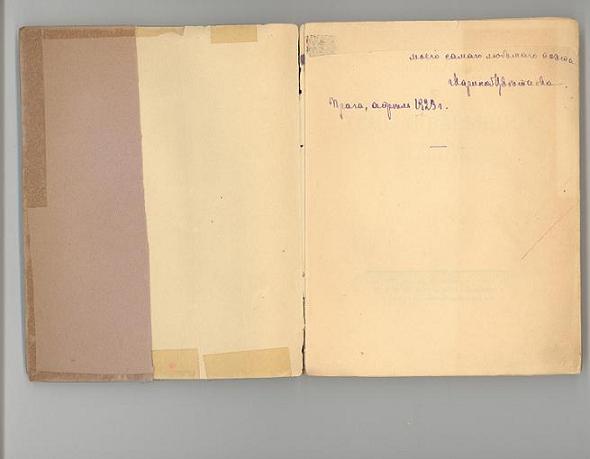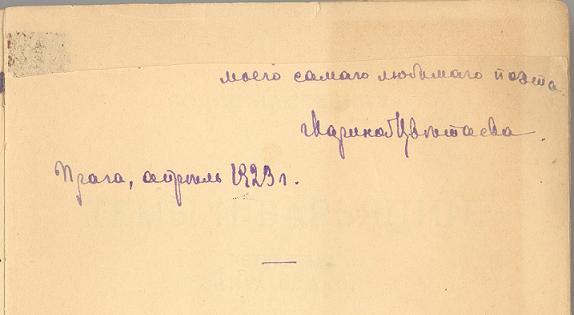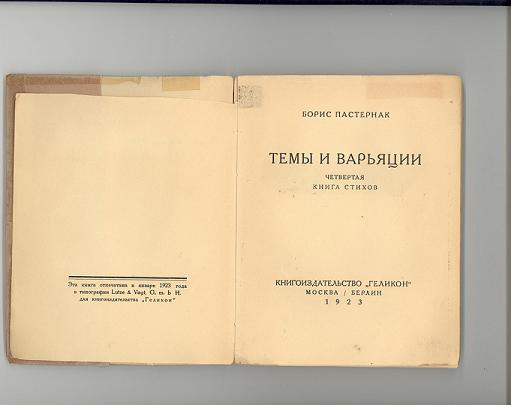Stanislav Shvabrin
Tsvetaeva's "Most Beloved Poet" -
Unknown Confession of Well-Known Admiration
The frequently reproduced authorial inscription on a copy of Pasternak's Temy i var'iatsii (Moskva/Berlin: Knigoizdatel'stvo "Gelikon," 1923) invites its addressee to turn to the opening lines of the fourth poem of the cycle "Ia ikh mog pozabyt'":
Несравненному поэту
Марине Цветаевой
донецкой, горючей и
адской (стр. 76)
от поклонника
ея дара, отважившегося
издать эти высевки
и опилки, и теперь
кающегося
БПастернак
29/I 23
Берлин [1]
As indicated, Pasternak is quoting from the poem printed on page 76:
Нас мало. Нас может быть трое
Донецких, горючих и адских
Под серой бегущей корою
Дождей, облаков и солдатских
Советов, стихов и дискуссий
О транспорте и об искусстве.
<…>
What can it be that stands behind Pasternak's reference to this poem in his inscription to Tsvetaeva? Could it - indeed should it - affect one's understanding of the poem? And (the problem most pertinent to this note's immediate topic, but largely insoluble within its modest scope) what was Tsvetaeva's response to Pasternak's gift?
Though by no means an integral part of the poem, so unequivocal an authorial statement elevates the status of Pasternak's inscription from mere afterthought, a kind of Parnassian courtesy, to that of important postscript, one that harks back to the poem's abandoned title. While the opening stanza of "Nas malo. Nas mozhet byt' troe," with its references to "soldatskie sovety" and "diskussii o transporte i ob iskusstve," does contain an evocation of the author's Futurist allies, the fact that in the manuscript it had a separate title of its own, "Poety" - "Poets" - encourages further investigation of this text's fluid intentionality, as it evolves along with the author's changing vision of his work.[2] Thanks to the inscription quoted above, this cancelled interplay of broadening and limiting statements (from the more general title "poets" to the restrictive meaning of the poem's opening line "There are few of us. Perhaps, three…") receives a powerful stimulus in Pasternak's resolute inclusion of Tsvetaeva in the fellowship of the chosen few, thus revealing yet another connection "above the barriers" between himself and Tsvetaeva in the select company of those worthy of the title of poet.
By asking Tsvetaeva to open Temy i var'iatsii at p. 76 and read the poem opening with the seemingly abrupt "Nas malo…," Pasternak was inviting her to take part in savoring the meaning of a crucial Pushkinian reference, to whose true significance both poets could relate from personal artistic experience (emphasis added):
Нас мало избранных, счастливцев праздных,
Пренебрегающих презренной пользой,
Единого прекрасного жрецов.
This variation on a "Mozartian" (Pushkinian, evangelical - see Pasternak 2003: 491) theme is not altogether drowned by the din of "discussions about means of transportation and about art" ("spory o transporte i ob isskusstve") rapidly approaching in the stanza's closing lines; it cannot be lost on attentive readers, and Tsvetaeva indubitably was one such reader early on in February of 1923. It may well be, however, that Pasternak, who was revisiting this poem in his inscription to Tsvetaeva, intended this echo to serve another important purpose. In trying to overcome a sense of alienation from his latest, already published book (cf. his characterization of the material comprising Temy i var'iatsii as "vysevki i opilki") through an appeal to the kindred spirit of a poet-friend, Pasternak may have been attempting to reinvigorate the emotional connection with "Nas malo. Nas mozhet byt' troe…" as a declaration of his alliance with Tsvetaeva via Pushkin.
Pasternak may not have had Tsvetaeva in mind when he was writing "Nas malo. Nas mozhet byt' troe…" in 1921, but by re-addressing it to the emigre poet in January of 1923 he was once again asserting his impartial position on the eve of his departure from Berlin to Soviet Russia. A facet of the two poets' fecund - and intricate - relationship (which began with a string of fortuitous meetings eventually leading to their mutual discovery in the summer of 1922), Tsvetaeva's response to Pasternak's Temy i var'iatsii ranges from fleeting reference to the dedications and direct appeals to be found in her verse and in her correspondence with Pasternak himself as well as her other trusted interlocutors and friends.
On February 10, 1923 (most likely hardly more than a day after receiving Temy i var'iatsii), Tsvetaeva wrote to Pasternak from Hornì Mokropsy:
Ваша книга. Пастернак, у меня к Вам просьба. "Так начинаются цыгане" - посвятите эти стихи мне. (Мысленно.) Подарите. Чтобы я знала, что они мои. Чтобы никто не смел думать, что они его.
(Tsvetaeva-Pasternak 2004: 36)
"Tak nachinaiutsia tsygane" is the closing line of the fourth quatrain of the celebrated "Tak nachinaiut. Goda v dva…" - in Temy i var'iatsii it precedes "Nas malo. Nas mozhet byt' troe…" in the same cycle "Ia ikh mog pozabyt'."
It would hardly be an exaggeration to say that Temy i var'yatsii became an instant source of inspiration for Tsvetaeva; indeed, the poet herself chose to characterize the effect produced on her by the book in much stronger terms. On February 11 - only one day after writing the letter cited above - Tsvetaeva wrote to Pasternak again:
Ваша книга - ожог <…> мне было больно, и я не дула. <…> Ну, вот, обожглась, обожглась и загорелась, - и сна нет, и дня нет. Только Вы, Вы один.
<…>
Теперь о книге вплотную. Сначала наилюбимейшие цельные стихи.
До страсти: Маргарита. "Облако. Звезды. И сбоку…", "Я их мог позабыть" (сплошь), - и последнее.
Жар (ожог) - от них.
<…>
В этой книге несколько вечных стихов, она на глазах выписывается,
как змея выпрастывается из всех семи кож.
(ibid.: 39, 41)
On March 9, having given up hope of meeting Pasternak in Berlin in person ("I hold a Soviet passport, but haven't got a notice [informing me] of a dying relative in Berlin, or connections to overcome [this difficulty]"), Tsvetaeva promised Pasternak:
О Вас, поэте, я буду говорить другим.
(ibid.: 51)
Tsvetaeva's subsequent writings, abundant in Pasternakian echoes bear witness that she remained true to her word. A hitherto unknown token of Tsvetaeva's response to Temy i var'iatsii - a miniature, though by no means negligible, admission of Tsvetaeva's admiration for Pasternak is introduced below.
* * *
By April 1923, Tsvetaeva had evidently come into possession of more than one copy of Temy i var'yatsii - the "little violet book" ("lilovaia knizhechka"), as she lovingly calls it in her letter to Pasternak of March 9, 1923. Some time in April 1923, Tsvetaeva inscribed one such copy to an unknown addressee. Tsvetaeva's inscription is reproduced here by kind permission of the book's present owner, Professor Michael Arthur Green.
The partially preserved inscription, in Tsvetaeva's inimitably idiosyncratic hand, complete with her signature, date, and decorative pen stroke, appears on the book's empty front flyleaf, which has the same watermark as the rest of the book ("SIEG-BUTTEN"). Originally the entire inscription consisted of altogether five lines that ran parallel to the flyleaf's upper edge.

The upper portion of the flyleaf has been removed - cut off with the clear intent of destroying all traces of the identity of the inscription's addressee (possibly by the addressee him- or herself). Only two miniscule fragments of the inscription's first, now irretrievably lost, line survive as two scarcely visible dots on the edge of the cut-off line.
The inscription's surviving fragment consists of a single phrase, which can be translated into English as "… my most beloved poet" (most likely Gen. c., possessive, but not Acc. sing. masc.; it is safe to surmise that the last word of the surviving part of the inscription was preceded by a noun, such as "book," "volume," "collection," etc., the surviving phrase's grammatical antecedent). Below is an enlarged image of the inscription preceded by a transcription (quotation marks signal the beginning and end of the inscription's surviving fragment; the missing part is in brackets):
"<…> моего самoго любимoго поэта.
Марина Цветаева.
Прага, апрель 1923 г.
___"

It is tempting to conclude that Tsvetaeva's choice of ink for her inscription was not haphazard: the violet ink of the inscription is an ideal match for the color of the book's paper jacket. The reverse side of the same flyleaf bears a short printed notice regarding the book's publishing history (similar to a copyright notice of today), which in this book's case appears before the title page.

Regrettably, the upper section of title page of the book (which would have been directly under the inscription's removed fragment) shows no trace or imprint of the missing inscription.
* * *
As promised, Tsvetaeva did talk about Pasternak with "others" ("drugie"). For example, a similarly though not identically worded reference to Pasternak is to be found in her letter to Prince Andrei Obolensky dated January 2, 1924:
Только что видалась с Вашим братом, разглядев его близко убедилась, что он похож на Б. Пастернака (моего любимого поэта!).
(emphasis added; Tsvetaeva 1995: 655)
Tsvetaeva's categorical use of an emphatic superlative referring to Pasternak in the inscription introduced here should by no means be considered its only notable feature. However minute in its physical dimensions, however oblique in its relation to the direct dialogue between the two poets, this fragment of the rich Tsvetaeva/Pasternak discourse deserves to be taken into account in a discussion of their momentous affinity.
Superficially, Tsvetaeva - who by her own admission had been "scalded" by the verse collected in Temy i var'iatsii - was understandably eager to share her admiration for Pasternak and his latest work, thus making this inscription another testimony to the intensity of her feeling for her fellow poet. On a more subtle level, Tsvetaeva's statement is fraught with disagreement with Pasternak's own dismissive evaluation of Temy i var'iatsii as "vysevki i opilki" of the publication of which he felt compelled to "repent." In inscribing this book to an unknown and very likely unknowing addressee, Tsvetaeva was not only fulfilling a conventional obligation appropriate in the situation that led to the inscription's appearance, but also resolutely contradicting the author's own disparaging assessment of the merit of his book.
As is known to the reader of the Tsvetaeva/Pasternak correspondence, the two poets explored the outmost limits of intimacy attainable to a man and a woman that are drawn to each other but separated by distance and circumstances. The complexity of this emotional bond can hardly be exaggerated, especially in view of all that was to change in Tsvetaeva's life in the wake of the fateful encounters and events that took place in April 1923, yet one cannot but be reminded of another statement made by Tsvetaeva on a very different occasion:
Меня не обманули только Б. П<астернак> и Рильке.
(Tsvetaeva 1997: 156-57)
Works cited:
Tsvetaeva 1995 - Tsvetaeva, Marina. Pis'ma. Sostavlenie, podgotovka teksta i kommentarii L'va Mnukhina. Moscow: Ellis Lak, 1995. Vol. 6 of Sobranie sochinenii v semi tomakh. Sostavlenie, podgotovka teksta i kommentarii Anny Saakiants i L'va Mnukhina. 7 vols. 1994-95.
Tsvetaeva 1997 - Tsvetaeva, Marina. Neizdannoe. Svodnye tetradi. Podgotovka teksta, predislovie i primechaniia E.B. Korkinoi i I.D. Shevelenko. Moscow: Ellis Lak, 1997.
Tsvetaeva-Pasternak 2004 - Marina Tsvetaeva, Boris Pasternak. Dushi nachinaiut videt'. Pis'ma 1922-1936 godov. Izdanie podgotovili E.B. Korkina i I.D. Shevelenko. Moscow: Vagrius, 2004.
Pasternak 2003 - Pasternak, Boris. Stikhotvoreniia i poemy 1912-1931. Sostavlenie i kommentarii E.B. Pasternaka i E.V. Pasternak; predislovie L.S. Fleishmana. Moscow: Slovo, 2003. Vol. 1 of Polnoe sobranie sochinenii s prilozheniiami. Glavnyi redaktor D.V. Tevekelian. 11 vols. 2003-05.
Notes
I would like to thank K.M. Azadovskii, E.B. Korkina and L.A. Mnukhin, whom I consulted in the course of my work on the present note. I am particularly grateful to I.D. Shevelenko for an expert discussion of problems pertaining to the inscription's origin.
© S. Shvabrin
| 
